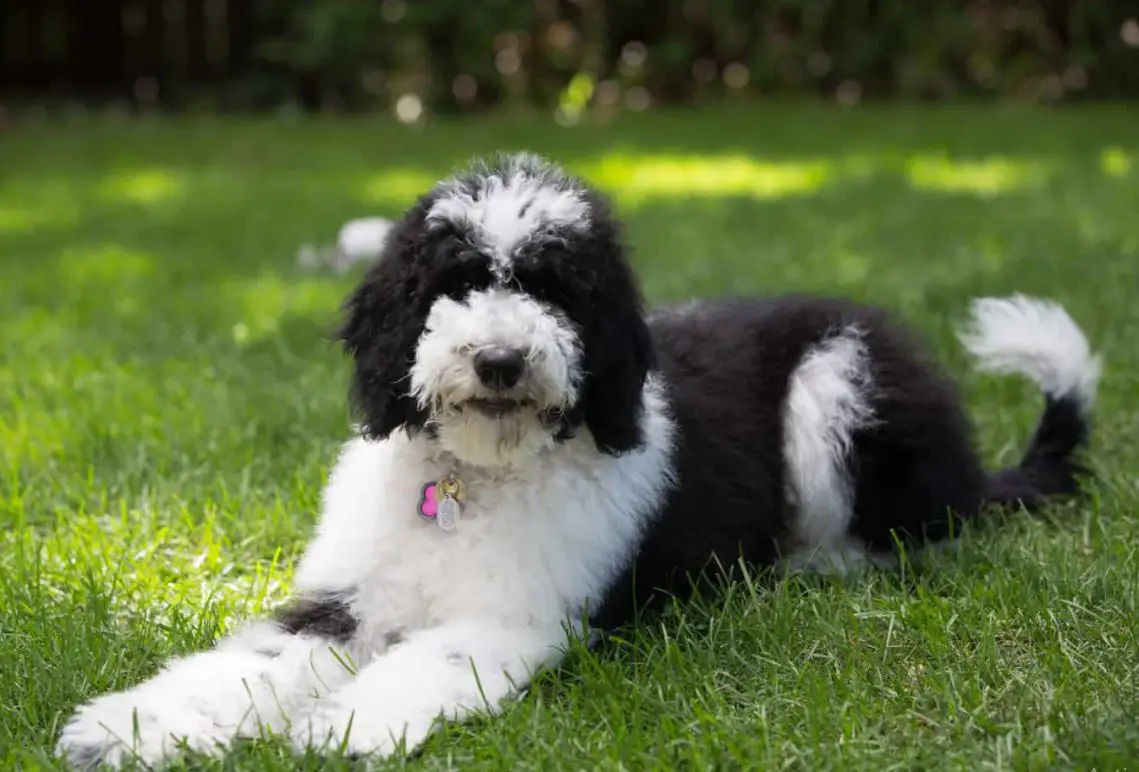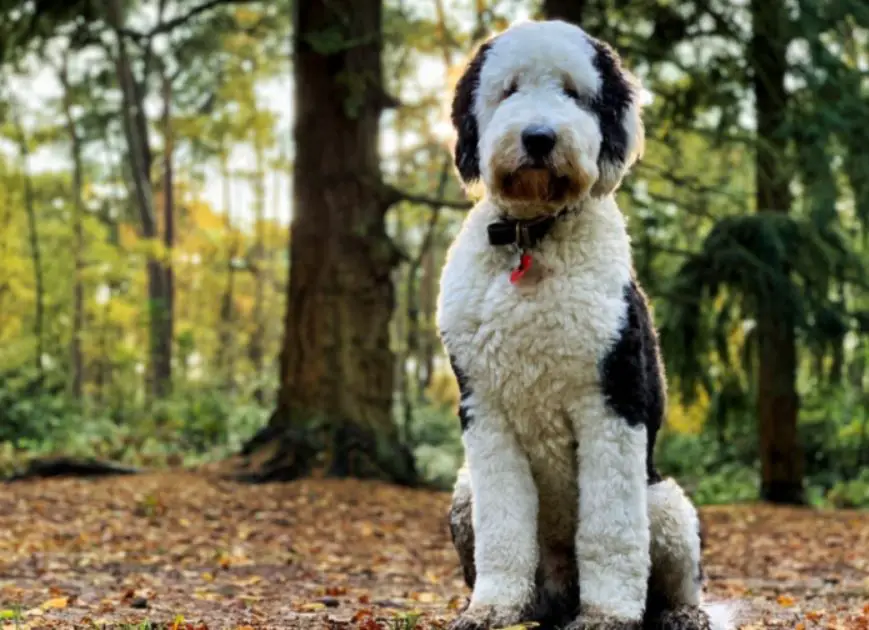Pros and Cons of Sheepadoodle Ownership-Complete Owners Guide

A Sheepadoodle was bred for the general public to be a pet for dog owners who are hypoallergic.
Although there isn’t a truly hypoallergenic dog, the Sheepadoodle does have less dander. This breed was also bred to be a companion dog and loves spending time with their family members.
What is a Sheepadoodle?
Your Sheepadoodle is a mix of an Old English Sheepdog and a Poodle. Other names for this breed are a Sheeppoo or Sheepdog Poodle Mix. Since a Sheepadoodle is not a purebred dog, they are not registered within the American Kennel Club.
However, your dog can be registered with the Dog Registry of America, American Canine Hybrid Club, and International Designer Canine Registry.
Sheepadoodle History
The poodle were popular pets in the past, especially with the upper ladies of society.
It’s because the poodle was so tiny, the dog could be carried around easily. Poodles were first bred in Germany to hunt waterfowl.
Old English Sheepdogs were first popular in the 1800’s with farmers. These dogs were used to herd sheep and keep other farm animals under control.
Breeders decided to breed the intelligence and the activeness of a sheepdog with the friendly nature and low shedding of a poodle. An Old English Sheepdog can be mated with a toy, standard, or miniature poodle.
This makes the size of a Sheepadoodle vary, although the standard poodle is most often used.
What Makes Up a Sheepadoodle?
Size and coat:
Your Sheepadoodle can be a big dog with males between 13-24 inches tall and females about the same height.
Male dogs can weigh between 60 and 80 pounds, with females weighing between 45 and 65 pounds.
The reason for the extensive range of numbers is because of the various genes your dog can inherit from his parents.
The coats of your Sheepadoodle can vary in color and length. Most Sheepadoodles have long coats that could be flat, wavy, or curly. Most coats that are longer will need to be trimmed every two or three months.
Your dog will also need to be brushed two or three times a week to remove any dirt or debris.
The color of a Sheepadoodle can be white, black, or black and white. A rare color is gray, or sometimes they have a patch of color around his eyes. Your pup’s coat could also be brown or merle.
Plus, your dog will have a sturdy build, with a rounded or square face and an elongated snout. His eyes are small, and he’ll have gorgeous low-hanging ears.

Personality and temperament:
This breed has a wonderful personality, is very affectionate and intelligent.
The dog will bond with your family and will love them unconditionally. They are energetic, loving, kind, and obedient.
A Sheepadoodle is super calm, gentle around children, and gets along with other pets as well. They are not domineering or overbearing towards other animals. Your dog can also be highly expressive and show that when you or a family member walks through the door.
Family dog:
A Sheepadoodle is an exceptional dog for your family regarding temperament and general disposition.
Your dog will love to cuddle on the couch with you, all 80 pounds of him! These dogs love children are friendly and dutiful.
A Sheepadoodle that has a laid-back temperament is a playful and loyal dog breed. The one thing you will have to watch for is the “herding” tendency.
If you have small children, your dog may nip at their heels to push them where your dog wants them. So, a Sheepadoodle may be better suited for a family with older children.
Guard dog:
Your dog can be taught to be a watchdog and trained to bark at strangers.
But they are very gentle and would never harm a family member.
Intelligence:
Both the Old English Sheepdog and the Poodle are known to be intelligent.
But Poodles are known to be extremely intelligent, and this trait is often passed onto their puppies. So your Sheepadoodle could or could not inherit this specific trait from his Poodle parent. It depends.
Since your dog is one of a mixed breed, it can’t be determined what your dog will inherit. Some Sheepadoodles are more intelligent than others.
You’ll have to wait until he’s older and see how your dog turns out.
Intelligence is also based on the experiences your dog has. If your dog practices a skill or behavior repeatedly, he will become better at it.
But overall, Sheepadoodles are considered to be intelligent dogs.

Training
Training your pet will probably be pretty straightforward. Of course, your dog will aim to please you, so he should learn to respond to your commands quickly.
But it is crucial to begin training at an early age. Plus, when your pup is smaller, he’ll be easier to control.
Train your dog for about 15 minutes a day and plan for more than one session. You will need to continually introduce new commands, however, or your dog will become bored.
Socializing is as essential as training. Introduce your Sheepadoodle to other people and animals. Take them along with you when you do chores or when you’re out and about. When you do this, it will help your dog to interact with different animals and people.
Grooming Needs
Your dog will have a low shedding level, but you still need to brush him daily. Your pet’s coat will tend to get mats. Also, you will need to keep your pet’s nails trimmed. If they become too long, then your pet will have trouble walking.
Your dog’s ears will need to be maintained. His ears will need to be cleaned to remove any dirt or debris. You can use an over-the-counter ear cleaning solution for pets to keep wax from building up and keep them clean.
When you do this, it will lessen the chance of an ear infection.
Your pet will also need a sanitary trim about every five to eight weeks. Plus, in the winter, his coat will collect snow. Once his coat is wet and frozen, it will take a while to thaw out.
Also, brushing your dog’s teeth a couple times a week should be part of the routine. If you don’t brush his teeth, then tarter and plaque can build up. If it builds up, it can lead to dental disease and other health problems.
Sheepadoodle Exercise Needs – Moderate
Your dog needs a minimum of about 60 minutes of exercise a day for an adult dog.
For a puppy, you should exercise him for 5 minutes for each month of age. So, if you have a four-month-old puppy, he would need 20 minutes of exercise.
A leisurely walk will give him enough time to sniff and investigate all the smells. Sniffing is good mental stimulation, and you both will enjoy your time together.
If you have a backyard, a rousing game of fetch will also take off the edge. Of course, dog parks are also another option where your pup will meet new friends.
Potty training:
Because a Sheepadoodle is such an intelligent dog, potty training is relatively easy.
Start when you bring your pup home and stay on a schedule. Nighttime potty training is easier because of your pup’s size. He’ll most likely sleep through the night.
Barking level:
This dog breed isn’t barkers but can be taught to bark when strangers come to the door.

Some of the Downside
Puppy mills:
Be careful where you get your Sheepadoodle from. Only buy from reliable breeders.
When you buy a puppy from a puppy mill, you don’t know anything about the parents. A certified breeder can show you a certification or a license.
High maintenance:
Your dog can be left alone only for a certain period of time.
This breed of dog becomes bored very quickly and can get into mischief if left unsupervised too long. In addition, prolonged loneliness can create separation anxiety in your pup.
If your dog is left alone without some kind of mental stimulation, he can develop destructive behavior. This could involve eating drywall, chewing on chairs, and even getting into your kitchen cabinets for a snack. Puzzle toys can help curb the kind of behavior to keep your dog from becoming bored.
Cost:
The cost of buying your pet from a breeder can vary in price.
Some Sheepadoodles can cost about $1500, while others can cost over $3000. The kind of puppy it is can affect the price too.
A standard Sheepadoodle puppy may cost around $1500. A Mini Sheepadoodle puppy cost around $1900, and a Micro Sheepadoodle can cost approximately $2,200.
You may find a Sheepadoodle at a shelter or rescue organization which would cost around $300 to cover the vaccinations and adoption fees.
What Are Some Health Issues?
Your Sheepadoodle could live between 12-15 years.
These dogs are usually healthy but can be susceptible to inherited diseases from either parent.
This is another reason why it’s in your best interest to buy your dog from a breeder instead of a puppy mill or backyard breeder.
Inherited problems from the Old Sheepdog side:
- Atrial Septal Defect: This defect is basically a hole in the heart. Although it is a serious issue, many dogs can live normal long lives. This condition tends to be asymptomatic for most dogs. Treatment isn’t needed until symptoms begin to show.
- Tricuspid Valve Dysplasia: This is similar to the atrial septal defect, but there are circulation issues because the heart isn’t formed correctly. This condition can cause heart failure. It’s managed with medications, exercise restrictions, and low sodium diets.
Inherited problems from the Poodle Side
- Corneal Dystrophy: This is when the cornea clouds, leading to complete blindness because it always affects both eyes. This is one of the most brutal of Sheepadoodle health problems. Unfortunately, there isn’t any treatment for it.
- Sebaceous Adenitis: This is a common skin problem that occurs in poodles. It’s a disease that affects the glands that secrete oil to moisten skin, becomes inflamed, and then eventually destroyed. This makes the hair matted with a whitish scaling of the skin. Then hair can be lost, and lesions appear on the skin. Treatment is antimicrobial administration and regular shampooing.
- Addison’s Disease: This disease affects poodles more than other dog breeds. The outer layer of the adrenal gland is destroyed. This destruction affects the dog’s body, from supporting the immune system to regulating the metabolism and more. Treatment is medication from the vet.
Inherited Problems from Both Sides
- Hip Dysplasia: This is a common orthopedic problem in large dog breeds. The condition is inherited, and it causes the hip joint to be built improperly. It leads to deteriorations and friction of the joint, and it is as painful as it sounds. It can lead to loss of mobility in the dog. Corrective surgery is the most common treatment, but other methods could include weight management, supplements, and pain management.

Interesting Facts About Sheepadoodles
The Sheepadoodle was used as the first dog breed in Army in the 1960s. Then after the 1980s, they started becoming popular with the general public, mainly because allergy sufferers could tolerate them.
They do not make much noise, so the Sheepadoodle can be kept indoors.
Sheepadoodles are excellent swimmers. Plus, these dogs have inherited intelligence from both parents and have highly developed cognitive skills.
Popular names for Sheepadoodles: Riley, Smoky, Sammy, Cassie, Duchess, Maggie, Pepper, Oscar, and Annie.
Conclusion:
So if you’re searching for a dog breed that is loving, playful, and silly, a Sheepadoodle may be just what you need.
From his fluffy teddy bear looks to the various colors of his fur, Sheepadoodles are a family dog and love their owners.
They are gentle, infrequently bark, somewhat hypoallergenic, plus these dogs don’t drool. Sheepadoodles are easy to train and extremely intelligent.
However, these pets need a good deal of exercise and act out if left alone too long or bored.
So, the question is, is this the dog for you?
Watch the video below for more answers to any questions you may have:
https://www.youtube.com/watch?v=4Q-fdajMBt4
References:
https://a-z-animals.com/animals/sheepadoodle
https://www.sheepadoodles.org//prosandcons.html
https://barkicollective.com/why-the-sheepadoodle-isn’t-for-everyone-the-10-things-to-know-about
https://spiritdogtraining.com/sheepadoodle-family-dog/


